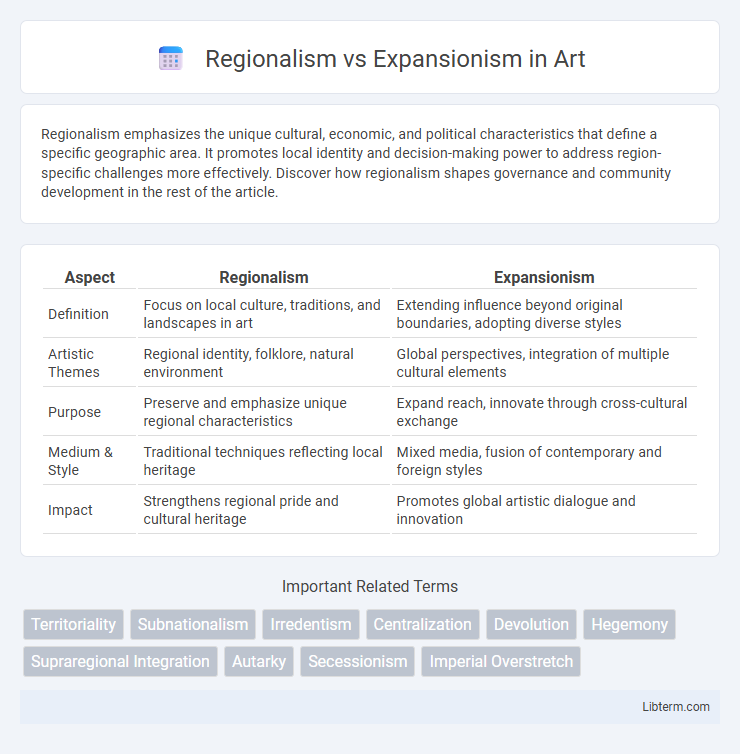Regionalism emphasizes the unique cultural, economic, and political characteristics that define a specific geographic area. It promotes local identity and decision-making power to address region-specific challenges more effectively. Discover how regionalism shapes governance and community development in the rest of the article.
Table of Comparison
| Aspect | Regionalism | Expansionism |
|---|---|---|
| Definition | Focus on local culture, traditions, and landscapes in art | Extending influence beyond original boundaries, adopting diverse styles |
| Artistic Themes | Regional identity, folklore, natural environment | Global perspectives, integration of multiple cultural elements |
| Purpose | Preserve and emphasize unique regional characteristics | Expand reach, innovate through cross-cultural exchange |
| Medium & Style | Traditional techniques reflecting local heritage | Mixed media, fusion of contemporary and foreign styles |
| Impact | Strengthens regional pride and cultural heritage | Promotes global artistic dialogue and innovation |
Introduction to Regionalism and Expansionism
Regionalism emphasizes prioritizing the political, economic, and cultural interests within a specific geographic area, fostering cooperation among neighboring countries to enhance stability and shared prosperity. Expansionism advocates extending a nation's influence through territorial acquisition, economic control, or political dominance to increase power and resources. Understanding the distinction between regionalism and expansionism is crucial in analyzing international relations and national strategies.
Defining Regionalism: Key Concepts
Regionalism is a political and economic ideology emphasizing the importance of geographic proximity and shared cultural, economic, or historical traits among neighboring states to foster cooperation and integration. Key concepts include the creation of regional institutions, policy coordination, and the pursuit of collective security or economic prosperity within a defined area, such as the European Union or ASEAN. Regionalism contrasts with expansionism by prioritizing collaboration and mutual benefit among existing neighbors rather than territorial growth or external influence.
Understanding Expansionism: Core Principles
Expansionism centers on the strategic growth of a nation's territory or influence beyond its current borders, driven by economic, political, or military motives. Core principles include asserting control over new regions to access resources, increase geopolitical power, and spread cultural or ideological values. This approach often contrasts with regionalism, which emphasizes preserving local autonomy and prioritizing cooperation within established geographic areas.
Historical Roots of Regionalism and Expansionism
Historical roots of regionalism trace back to the desire of communities to protect local interests, cultural identity, and economic resources within defined geographic boundaries, often emerging from historical conflicts and colonial legacies. Expansionism originated from imperial ambitions and the quest for increased political power, driven by the pursuit of resources, strategic advantages, and national prestige, as seen in the 19th and early 20th centuries during European colonial expansion. Both ideologies stem from differing responses to power dynamics, with regionalism emphasizing autonomy and preservation, while expansionism prioritizes enlargement and domination.
Motivations Behind Regionalism
Regionalism is driven by motivations such as economic cooperation, cultural affinity, and political stability among neighboring countries seeking mutual benefits. It often aims to enhance trade efficiency, security alliances, and shared resource management within a specific geographic area. Prioritizing collective regional identity and the reduction of external dependencies distinguishes regionalism from expansionism's focus on territorial growth and influence projection.
Drivers of Expansionist Policies
Economic interests, strategic military advantages, and technological advancements strongly drive expansionist policies, enabling states to access new markets, resources, and geopolitical influence. Nationalism and ideological motivations often reinforce expansionism, promoting territorial growth as a means of asserting power and identity. Furthermore, weak international institutions and power vacuums create opportunities for expansionist states to extend their dominance with limited resistance.
Regionalism vs Expansionism: Major Differences
Regionalism emphasizes strengthening economic, political, and cultural ties within a specific geographic area, promoting cooperation among neighboring countries. Expansionism focuses on extending a nation's influence and control beyond its borders through territorial acquisition or increased political power. Key differences include regionalism's emphasis on mutual collaboration and shared benefits versus expansionism's pursuit of dominance and resource exploitation.
Case Studies: Regionalism in Practice
Regionalism in practice is exemplified by the European Union, where member states prioritize collective economic integration, political cooperation, and shared regulatory standards to enhance regional stability and growth. ASEAN demonstrates regionalism through its emphasis on cultural cohesion, conflict resolution, and economic collaboration among Southeast Asian nations without aggressive territorial ambitions. These case studies reveal how regionalism fosters cooperative frameworks that contrast expansionist policies aimed at territorial or political dominance.
Expansionism in Contemporary Geopolitics
Expansionism in contemporary geopolitics reflects state strategies aimed at increasing territorial control or influence through military, economic, or political means. Major powers employ expansionist policies to secure resources, strategic locations, and global dominance, as seen in actions like China's assertive posture in the South China Sea and Russia's annexation of Crimea. These expansionist moves challenge regional stability, provoke international responses, and reshape global power dynamics.
Implications for Future Global Relations
Regionalism emphasizes cooperative frameworks among neighboring countries to address shared economic, political, and security challenges, promoting stability and integration within specific geographic areas. Expansionism seeks to broaden a nation's influence beyond its borders, potentially leading to geopolitical tensions and conflicts over resource control and ideological dominance. The interplay between these approaches will shape future global relations by balancing localized alliances with broader ambitions for international power projection.
Regionalism Infographic

 libterm.com
libterm.com